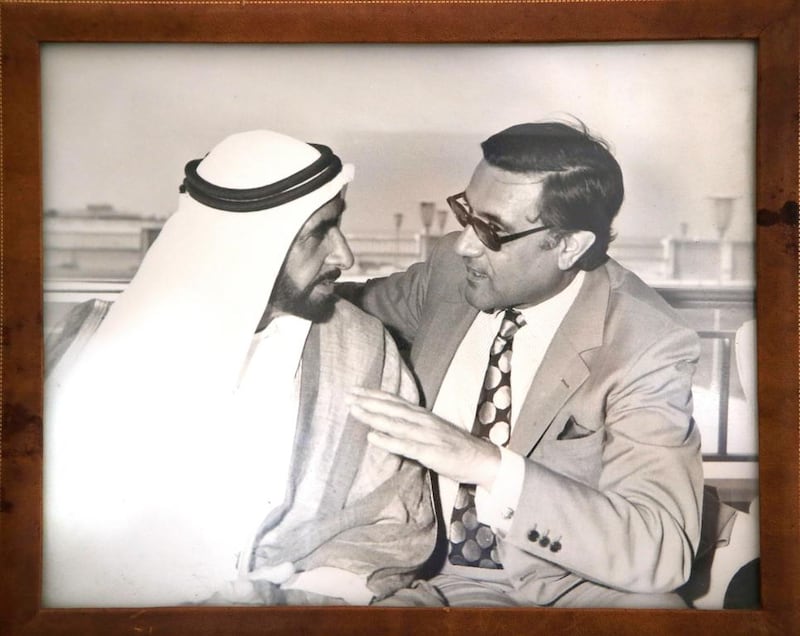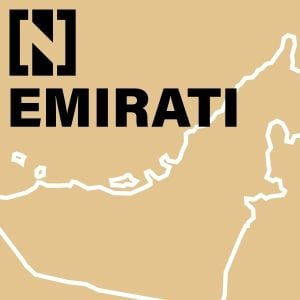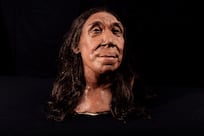On December 10, 1971, the flag of the UAE was first raised at the United Nations headquarters in New York.
Pulling on the rope, raising it high among the flags of other countries, was Adnan Pachachi.
“It was a nice crisp cold morning,” recalls the 92-year-old Pachachi, then the Minister of State, who still lives in Abu Dhabi.
“It was one of those great moments of history as you raise the flag of a new state and acknowledge its independence and its arrival onto the international arena.”
With a distinguished career spanning six decades, Pachachi, regarded as an elder statesman in his native Iraq, has witnessed this region’s biggest wars and met some of history’s best-known figures, including US president John F Kennedy, Malcolm X and Egypt’s Gamal Abdel Nasser. With the late Sheikh Zayed, he worked to lay down the foundations for a new state.
“Truly an outstanding personality,” says Pachachi of the Founding President. “He knew what he wanted, and he went after it, slowly building a powerful nation with strong roots.
“My first task before independence was to draw up a basic law for an Abu Dhabi Government organised along modern lines,” he says.
“It is the same law that is around now, with few revisions.”
Working with a small group, mostly of Iraqi compatriots, Pachachi also drew up plans for a parliament with an advisory role – what would become the Federal National Council.
“Sheikh Zayed wanted a modern state, taking some of the best values from the West, while keeping the values of the East and preserving UAE’s identity,” he says.
Pachachi was appointed Minister of State in the first Government of the emirate of Abu Dhabi and took up his office on July 1, 1971.
Within hours of the UAE’s formation, Pachachi flew to New York and submitted the application from the UAE for membership in the United Nations. Given his long career as Iraq’s foreign minister and ambassador at the UN, Pachachi had many colleagues and contacts at the UN.
“I saw that I had to convince two important permanent members of the Security Council, China and the Soviet Union, not to veto our application,” he recalls.
“At the time, there were close relations with the communist party in the south of Yemen, who opposed the creation of the UAE,” he says. “So I had long talks with them, and assured them that the UAE would not enter into any anti-communist alliances, would not be bound by any treaty obligations and would join the ranks of the non-aligned countries.”
The application was approved by the Security Council and the General Assembly, and on December 10, history was made.
“Secretary General U Thant, a friend of mine, at the time came out at the flag raising to say a few words of welcome. I later spoke at the General Assembly and the Security Council reaffirming the sovereignty of the UAE over the three islands [Abu Musa, Greater and Lesser Tunbs] occupied by Iran,” he says.
Despite the illegal occupation of the islands, Sheikh Zayed insisted on having “normal relations” with Iran, says the retired politician.
“If negotiations failed, he wanted the issue to be referred to the International Court of Justice for adjudication,” he says.
Pachachi would often speak at international conferences and summits as part of the UAE delegation, often headed by the late Founding President himself.
One momentous moment came in 1973 and was a result of US military support for Israel in the October War. Sheikh Zayed imposed an oil embargo, a move followed by other Arab oil-producing countries, and Pachachi was selected as the spokesman to convey Sheikh Zayed’s message at the European Summit in Copenhagen.
“We told them the embargo was imposed because of the large-scale military assistance given to Israel by the US, and we demanded justice for the Palestinians and the settlement of the conflict on the basis of total withdrawal of Israeli forces from Arab territories occupied in the 1967 war,” he says.
He also recalls how, when he complained about the freezing cold temperatures in his hotel suite in Copenhagen, “I was told that the heating was reduced to a minimum because of the embargo”.
Back in the UAE, Pachachi organised the Ministry of Foreign Affairs. “In foreign affairs, Sheikh Zayed realised from the outset that a small, but rich country like the UAE must be able to defend itself against those who might covet its land and riches. This could be done only if the country possessed a deterrent force capable of making others think twice before embarking on any aggressive act against the Emirates,” he says.
“Sheikh Zayed was a peaceful and tolerant leader and went a long way to settle disputes with neighbouring states even if such settlement entailed sacrifices.”
Pachachi was granted UAE citizenship in 1974 and served on the board of directors for entities including Abu Dhabi National Oil Company (Adnoc), the Abu Dhabi Investment Authority (Adia) and the Abu Dhabi Fund for Economic Development. He was also a member of the Abu Dhabi Executive Council and chairman of the General Projects Committee.
“Sheikh Zayed always looked ahead. He invested extra funds into projects and stocks abroad so that the country wasn’t completely reliant on oil. He always thought about what is best for his people and found ways to make the impossible possible,” he says.
From the window of a building in Khalidiya overlooking the bustling city of Abu Dhabi, Pachachi gestures and says: “The transformation is truly remarkable. From almost nothing but desert sands and a fishing village, to this. A modern capital city. And the whole world knows the UAE and what it stands for and what a magnificent and powerful small country it is.”
Openness to the world, from religious to cultural tolerance, are some of the secrets of the UAE’s success, he added.
“Sheikh Zayed focused on internal development, for when you are strong internally, you can grow to become strong externally on the international front. This is something unfortunately many of the Arab states failed to do and hence have fallen apart.”
Pachachi retired in 1993, at the age of 70, but remains active, writing books, travelling and giving lectures. Fit, full of energy and still with perfect eyesight, he smiles as he shares the secret to his eternal youth: “swimming, listening to classical music and admiring beauty in the world.”
As someone who has witnessed so much, and was involved in some of the most intense negotiations and treaties, he says one of his regrets is not seeing a different union succeed.
“It is such a shame that Iraq and Syria did not unite, becoming the powerful heart of the Middle East. Instead, these two great nations, with such a great civilisation and such great hopes, became the heartache of the region,” he says.






